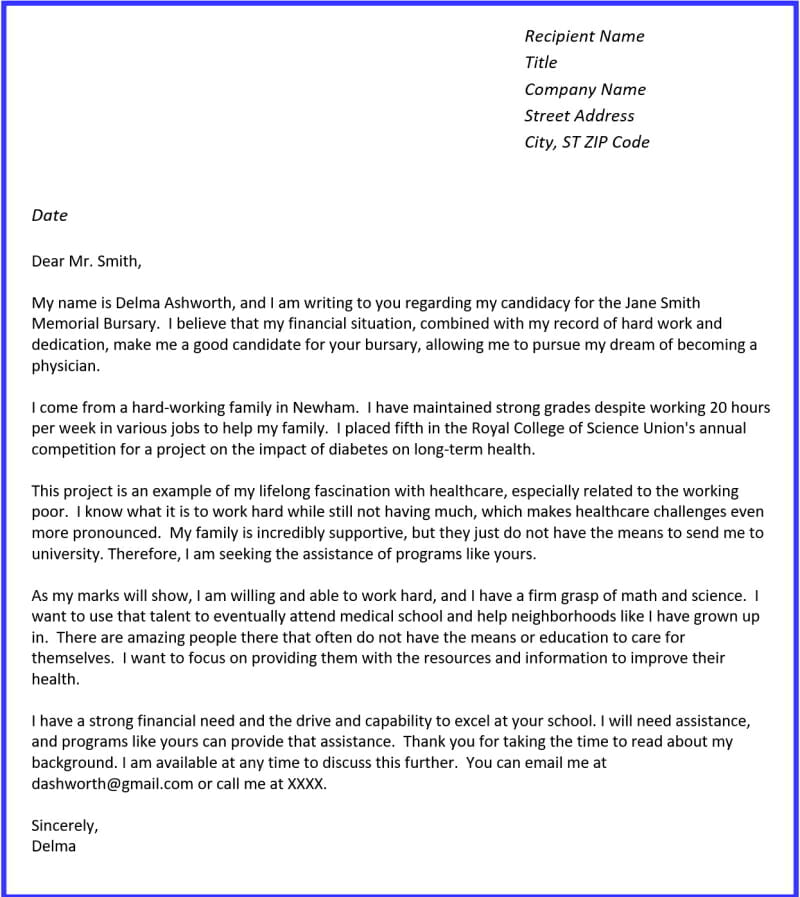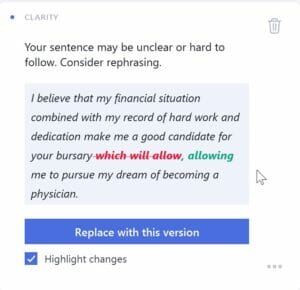

Your bursary application requires you to write a motivation letter. But how do you write one that convinces the reviewer that you’re the best candidate for funding? If you’ve been accepted to a university or college, you’ve probably heard the word “bursary” thrown around. A bursary is a financial award that does not need to be paid back. It’s a form of grant rather than a loan. It is usually awarded based on financial need, merit, or some combination of the two. It can help to include a strong motivation letter with your bursary application.
A bursary can help immensely to offset the high costs of university education. While many students take out student loans to cover costs, it’s always better to not have to pay that money back. Let’s look at how we can write a strong motivation letter for a bursary application.
Some of the links in this post are affiliate links. This means if you click on the link and purchase the item, I will receive an affiliate commission at no extra cost to you. All opinions remain my own.
A bursary is a financial award that does not need to be repaid. A bursary may be based on financial need or merit and is intended to supplement your income and help pay for school fees, supplies, and living expenses. The word “bursary” comes from the Latin “burra” which means cloth. The purpose of the award dates back to medieval Europe where students would wear a bursa or burse (bag) around their waist to represent their scholarship support. Thankfully, we don’t need to wear a bag, but you do need a strong application.
A bursary, or bursary award, will usually have an application process. In that process, you may need to show why you should be awarded the bursary. You may need to show a financial need for the award. You might also have to show merit, or that you deserve the award for another achievement, often academic. Often, there is a component of both required so even if you have a strong academic background, your award may be changed depending on how much money you or your family have.
Bursaries are designed to allow someone to attend college who could not otherwise, so there will usually be a financial component to the eligibility.
Bursaries and scholarships are very similar and, indeed, there is some overlap. Scholarships, though, often will not have a financial requirement (though it’s not uncommon.) Scholarships may be awarded for participation in a group, academic achievement, heritage, or any number of requirements. Bursaries normally have at least a financial component. The good news is that you don’t have to pay either one back.
Depending on the award, you may be able to use a bursary to pay for tuition costs, books, and supplies, living expenses, or any combination of these. The specifics vary with each bursary but you will always have some combination of these expenses. Bursaries provide you funding for college without increasing your financial burden after graduation, so they are a tremendous opportunity.

The first job is to find the bursaries that you are eligible for. This can be its own challenge, so we are going to provide you with some tips and tools to find them.
Oftentimes, bursaries are listed with scholarships and grants, so you can often use the same search engines. Here are a few to get you started:
This is by no means a complete list but it will get you started. Of course, searching online for programs is a great place to start. A good strategy there is to search “bursary” followed by keywords like the name of the school you want to attend, your country, your interests, and similar things. Often you won’t find anything but you might be surprised by what you find.
Also, many schools have resources to help you find opportunities, so you may want to call your school or email them and discuss any options that they know about. They do this all the time and so have a lot of knowledge about what’s available.
A motivation letter for a bursary application is a letter that you write to the organization that awards bursaries to express your interest in the bursary and why you are a strong candidate. Bursaries can be extremely competitive and you want to take every opportunity to make yourself look like a strong candidate for the program.
The letter should be addressed to the organization that gives bursaries. Ideally, to a person at that organization. You are looking to make a connection with reviewers. If you can find the person receiving the letters and applications, that is wonderful and ideal. Even if it’s addressed to the wrong person, but you are close, that’s okay. It shows that you took the time to research the organization and the people. It shows initiative.
You will be the one to write it. While someone else, like your parents, can help you write it and you should have someone else review it, you want to be the one to write it. Remember, you are trying to show why you are a strong candidate. Not taking the time and effort to advocate for yourself can make you look bad in the eyes of someone reviewing your application.
If you are applying for more than one bursary, you want to write a separate letter for each. While this means more work, this will give you the best chance of being recognized for each of them. Using the same letter is likely to make your letter look more like a form letter (which it is) and that you didn’t give the application the time and attention that it deserves.
Before we can start writing, we have to do some preparation. You will want to assess what the requirements are for the bursary, how you meet them, and what qualifications you have that most qualify you. Start by reviewing the application, website, and any other information you have about the bursary. Write down any qualifications or preferences that the bursary program has. Include a segment on financial need. Much of the financial need comes down to numbers but it can’t hurt to consider for your letter.
Next, review the program that you are trying to fund with the bursary. Write down the answers to the following questions:
Using these answers, make a list of qualities, experiences, and achievements that most qualify you for this program. Consider everything that you have accomplished or participated in. Right now, you’re looking for quantity over quality. We will narrow it down when you write your letter. This is to give you ideas without thinking too much about the letter. Here are some ideas to prompt you.
This may not be a complete list but it should get you started. You are looking for anything unique, impressive or distinct but at this phase, just write down as much as you can think of.
We recommend a three-part letter. This makes it easier to write and to read while still giving a reader a good overview of who you are and why they should choose you. Your letter should be no more than one page. Many people aren’t going to read beyond that anyway. You want to make it as easy on a reader as possible.
The three parts of the letter include
Of course, this sounds easy but writing something this important is never that easy. We will start with the hardest part, the body. This will give you your messaging for the introduction and conclusion.

This is an editable version of our Motivation Letter for Bursary. You can download it in Microsoft Word format, which you can use in Microsoft Word or on Google Docs. Use this version to customize the letter for your situation. Make sure to show your strengths and why you would make a great candidate for the position.
Using the notes that you made above, construct 1-3 paragraphs that describe why you would make a great candidate for the bursary. This will be different for everyone but a few different strategies that you can use include
These are examples of the strategies that you can apply when writing your motivation letter that you include with your bursary application. Whatever you choose, make sure that your motivation is genuine and honest. This needs to be your story and it needs to be a real one. That’s why we ask so many questions early on. We want to get as many possibilities as we can to write your letter.
We all have a story to tell. You need to find yours. Once you have that, the letter becomes much easier to write.
With the body of the letter written, then you can write your introduction and conclusion.
The introduction is fairly simple. Introduce yourself and the bursary that you are applying for. Then include one or two sentences summarizing why you are applying.
“My name is Lilivati Chanda and I want to express my interest in the Entrance Bursary Program at McGill University. Your amazing program in Earth Sciences will help me achieve my dream of becoming a leading researcher in climatology. I have long been interested in protecting our environment and, as the first in my family to go to college, I want to continue that passion in my studies.”
Just a few sentences are usually enough. You want to set the stage for the rest of the letter.
The conclusion is similar. Thank them for their time on your application. Let them know you would be happy to discuss any questions they have and provide them with your phone number and email address.
If you are applying for multiple bursary programs, make sure that each letter is different. Each program deserves its own time. The good news is that you can use the same preparation for all of them so once you have written the first one, the others become easier.
We have written this guide to help you write your own letter. Sometimes, we get asked for more help from our readers. Unfortunately, we don’t have the resources for that but we want to give you any help we can.
Probably the best resource we have found for such help is to look on Fiverr to hire someone. Fiverr is a marketplace where you can hire someone for a specific project. They offer different projects at set prices that you can hire them for. This link will take you to a search for freelancers that do motivation letters specifically. We can’t offer any specific names on there because the freelancers change. We can give you some pointers on finding the right person for you, though.
Make sure to review their projects and their reviews. Some might offer letters specifically for MBAs or education applications. Others might just do motivation letters. That’s probably okay. If you’re not sure, you can contact them and discuss it with them before hiring them. Here are the things to look for if you contact them (which isn’t a bad idea even if you think they’re great).
The good news is that these are writers who do this a lot and have seen a number of ways to do it. Often Fiverr offers reasonable deals at reasonable prices for projects like this. Just like anything else, you just need to make sure you hire the person for you.
While we can’t recommend a specific freelancer, please make sure you leave a review, especially if you find someone really good or really bad. That way, other readers can find the right freelancer when they need them. If we all leave reviews, then we can find the best people together to help us out.
You want to review your letter and check the spelling and grammar. There’s nothing worse in a letter designed to show how good you are than a letter with spelling errors and grammatical mistakes. You can start with the spell checker in most word processing programs (like Microsoft Word or Google Docs.) These will pick the big error.
Another great resource is Grammarly. Grammarly is a great tool that will catch when you mix up common spelling errors like mixing up “to” and “too”. The free version is great and works with most programs that you’ll be using for your motivation letter. If you’re writing in a language other than your primary language or you’re not a strong writer, you might want to look at the paid version. It will give you suggestions, help you with the tone of your letter and a lot of other help.

If you aren’t ready to write your own letter or want someone to edit or review your letter, you can hire help. One great resource for that is Fiverr. Fiverr has freelancers who have expertise and experience in various skills. This includes writing motivation letters. There are a lot of freelancers there with various skills. Make sure to interview them thoroughly, read their reviews and even ask for samples. The best ones should be willing to do that for you.
Below is a sample motivation letter. It uses the concepts above to provide a sample and format of what a motivation letter for a bursary can look like. It’s important that you don’t use this letter. You need your own letter and not ours. This is designed to help you get started.
Good luck! We would love to hear how it goes.
We offer an editable version of this letter for $5 (USD) that you can purchase here.
